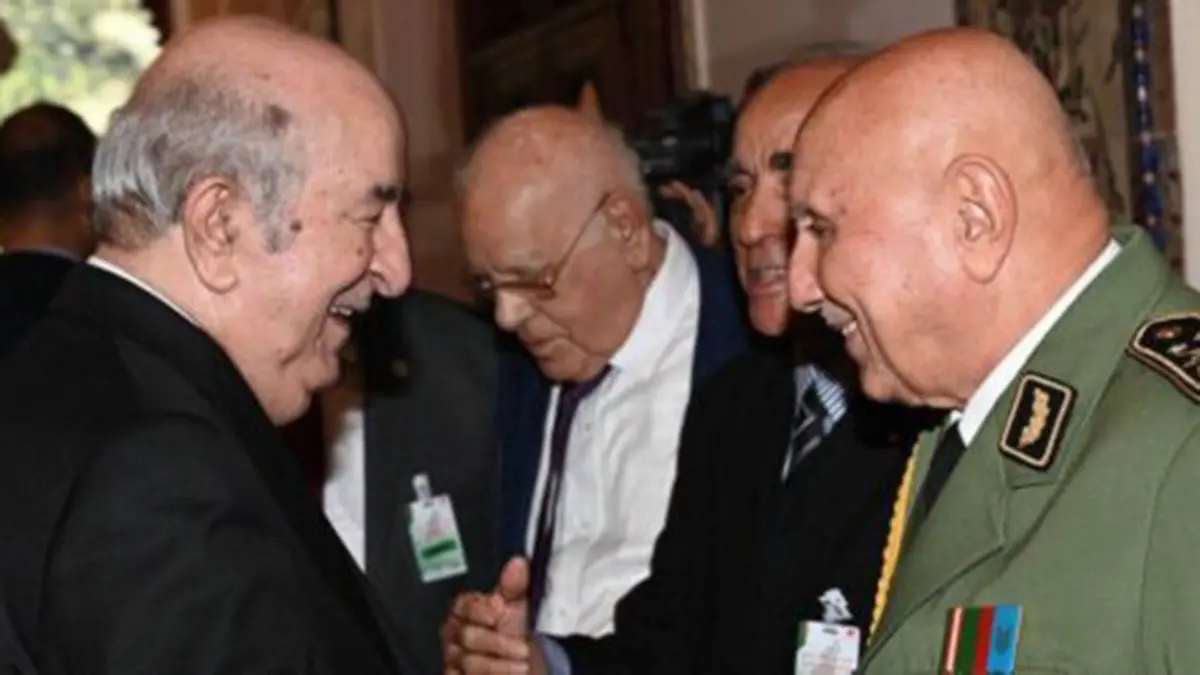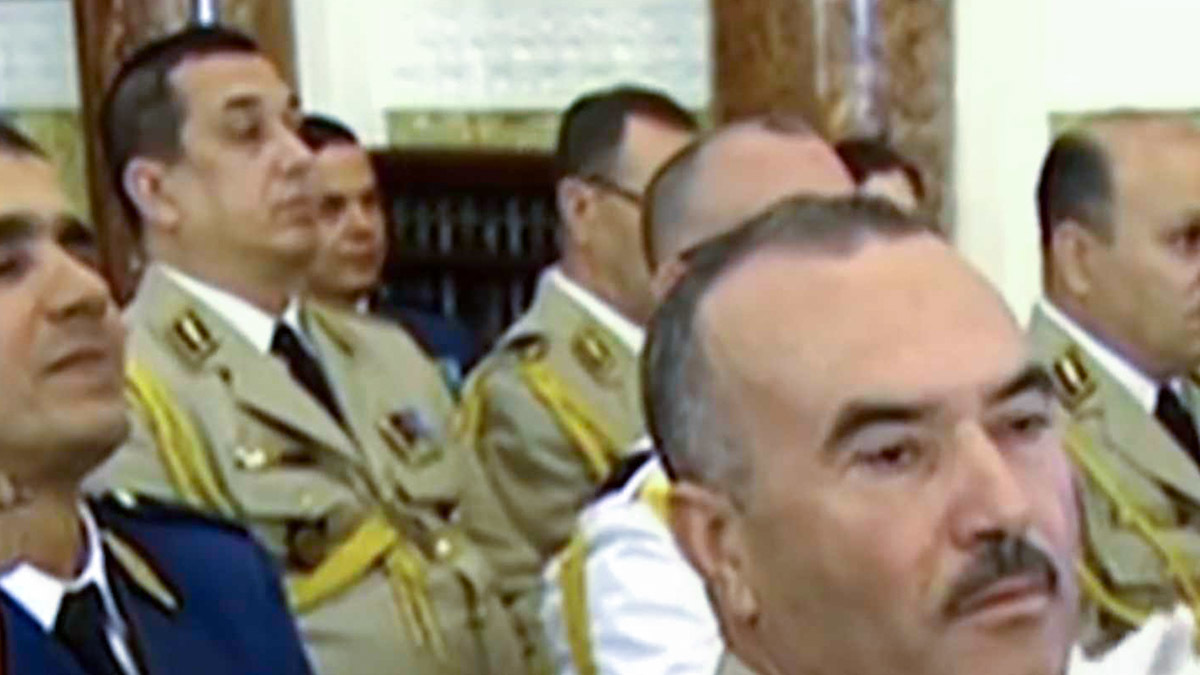General Sadek succeeds Djebbar Mehenna as head of Algeria's external security

The first decision taken by President Tebboune, the day after his inauguration for a second five-year presidential term, was to dismiss Major General Djebbar Mehenna, head of the General Directorate of Foreign Documentation and Security.
After lengthy discussions that ended in the early afternoon of Thursday 19 September, the final decision was made. Gone was the 78-year-old general from Tizi-Ouzou, reviled by the children of his region, who called him KDS (Kabyle De Service), and by his subordinates for his cruelty and conduct unworthy of a military officer.
It was not for his shady past in the 1990s, nor for the crimes he committed during that period, that he was dismissed by President Tebboune, whose entourage is infested with the likes of General Djebbar. Nor for his incessant failures in the management of Libyan and Malian affairs, nor for the scandal of the failed ‘Great Evasion’ he had conceived and carried out against neighbouring Morocco, which were at the root of his dismissal. Nor for his latest scandal, signed by his son Mouloud, arrested in France for cocaine trafficking.
The newly re-elected president has a grudge against him for a personal matter. Strictly personal. The operation that has been going on for more than a year to get rid of him before the end of his first term and, failing that, to block his path to the second term, which Abdelmadjid Tebboune is pursuing with all his might.
General Djebbar's days had been numbered for several months. Since the arrest of one of his agents, Saïd Bensdira, better known as the ‘London rat’, by the French police in Paris last April. This arrest exposed the intrigues of the foreign security chief. All the evidence of General Djebbar Mehenna's machinations was contained in the laptop and smartphones seized from the rat. ‘But we had to let the presidential election of 7 September pass and then we would settle the score,’ confided a person close to Tebboune.
As soon as the presidential election was over, and less than forty-eight hours after his inauguration, Tebboune could not bear to see the unfaithful general in his midst for a minute. His sons, Mohamed and Khaled, found him a man they could trust to succeed him. A man who would eat out of his hand and with the right profile. He is General Rochdi Fethi Moussaoui, former head of the security office of the Algerian embassy in Paris.

Portrait of the new foreign security chief
He had met the Tebboune children in Berlin, when he was in charge of the security office of the Algerian embassy in the German capital. He took advantage of the president's long stay in a Berlin hospital from 28 October to 29 December, after contracting the coronavirus in October in his Algiers environment.
Colonel Rochdi Fethi Moussaoui was the only person staying in the same hotel as the president's family and the head of presidential security. He befriended Mohamed, Tebboune's eldest son. They are together every day. Inseparable. Mohamed Tebboune, despite being the son of a president, was delighted to be friends with a senior intelligence officer. The military complex obliges him. And as he likes to spend weekends in the French capital, he never fails to whisper in his father's ear about his friend Colonel Sadek's (his official nickname) destination in Paris.
Rochdi Fethi Moussaoui, the son of a diplomat from a revolutionary family originally from Annaba (in the east of the country) but who also has his roots in the Casbah of Algiers, has inherited a sense of diplomacy, always having the right word to say at the right time and being helpful, courteous and very friendly with his counterpart. This is what made his colleagues say that he was a bit of a brush. Especially with his bosses. In fact, he always maintained excellent relations with his superiors. He was friends with his bosses' families. Although he was new in the service and a very young officer, he maintained good relations with Major General Rachid Laalali alias Attafi, former head of the DGDSE.
Born in 1977 (47 years old), Fethi Rochdi Moussaoui joined the army and, more specifically, the external security services in 1999. Why external security? One of his close associates explains it by the fact that his father and one of his uncles were diplomats. Boualem Moussaoui was Algeria's second ambassador to Paris, appointed in September 1963 to succeed Abdellatif Rahal. Boualem Moussaoui, born in Algiers in September 1926, began his activism at the age of seventeen in the P.P.A. (Algerian Popular Party), then M.T.L.D. (Movement for the Triumph of Democratic Liberties). He joined the F.L.N. at the beginning of the revolution and was arrested in Algeria in May 1956 and interned in Fresnes. Released after the Evian agreements, he joined Mr. Ben Bella in Tunis, then in Tlemcen, during the August 1962 crisis, and became a member of the national coordination commission which was to prepare the proclamation of the F.L.N.'s political bureau.
There was also Lahcene Moussaoui, former Algerian ambassador to Tunisia, from September 1992 to January 1996. At that time, he succeeded Ahmed Attaf as Secretary of State for Cooperation and Maghreb Affairs (from 1996 to 1999) in the Ouyahia and then Hamdani governments. He was appointed Algerian Ambassador to Brazil on 14 February 2001, before retiring. Lahcène Moussaoui took advantage of his retirement to publish a book entitled ‘Dialogue between a madman and himself: In search of your impossible love, Algiers’.
Born and raised in Algiers, Rochdi Fethi Moussaoui, alias Sadek, is lucky enough not to have been involved in the civil war, so he can boast of having clean hands. No blood or dirty money on his hands. Will he be able to resist the siren calls? ‘Now that he is very high up in the hierarchy, he will undoubtedly be much sought after by all the businessmen, especially those of the presidential clan, a clan to which he owes his wealth. A clan to which he owes his meteoric rise,’ confided one of his acquaintances.
After barely four years as a colonel, he was promoted to the rank of general at the suggestion of his friend Mohamed Tebboune. A promotion that triggered a silent protest in the DGDSE. Some of his colleagues had been languishing at the rank of colonel for 15 years. But they have not had the opportunity to meet and befriend Tebboune's sons.
Be that as it may, Tebboune has just made his mark by ousting one of the army's dirtiest generals. He was sentenced to eight years in prison by the Blida military court for ‘illicit enrichment, influence peddling and money laundering’.
While in command of the Research and Documentation Centre (CRI) of the 1st military region, Djebbar Mehenna transformed the CRI into a centre for torture and extrajudicial executions. In the same way that he had transformed part of the Le Palace hotel in Blida into a brothel of which he was the regular pimp.
After four years in the high command of Army General Saïd Chengriha, he ended his career with another scandal, when his son Mouloud was arrested in Marseille for cocaine trafficking.
When will it be the turn of his protégé, accomplice and friend, General Abdelkader Haddad, alias Nacer El-Djenn? Author of an incalculable number of murders of ‘poor innocents whom he shot in the head while they were tied up’, according to the testimony of Sergeant Major Houari, who met him at the Main Military Research Centre of Ben-Aknoun, in the hills of Algiers... the current head of internal security must start counting his days if Tebboune wants to clean up the security services run by former CPMI members.









